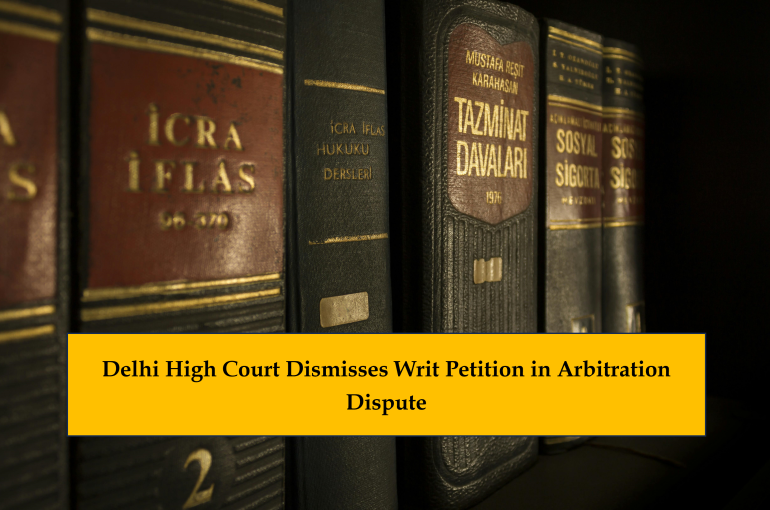DELHI HIGH COURT DISMISSES WRIT PETITION IN ARBITRATION DISPUTE
Background and Legal Arguments
The central issue in this case arose from an order by a sole Arbitrator dated August 22, 2024. The Arbitrator deferred the question of limitation, whether the Petitioner’s claims were time-barred until the final disposal of the case. The Petitioner contended that this decision contradicted a specific directive by the High Court in an earlier order dated February 16, 2024, which mandated the Arbitrator to resolve the limitation issue preliminarily before proceeding with substantive arbitration.
The Petitioner argued that the issue of limitation, being a threshold matter impacting the Arbitrator’s jurisdiction, should have been decided upfront. Failing to do so, the Petitioner asserted, could render the arbitration proceedings null and void if it were later determined that the claims were time-barred. The Petitioner relied on the ruling in Bhaven Construction v. Executive Engineer Sardar Sarovar Narmada Nigam Limited, CA No. 14665/2015 highlighting the need for judicial oversight in cases where the Arbitrator deviates from the prescribed procedural framework.
In response, the Court, referencing rulings in C.S. Construction Company Private Limited v. Excelling Geo and Engineering, W.P.(C) 10027/2024, and Hindustan Alloys Private Limited v. Maa Sheetla Ventures Limited, W.P.(C) 10561/2024, emphasized that writ petitions under Articles 226 and 227 should only be entertained in arbitration matters under rare and exceptional circumstances. The Court reiterated that the Arbitration and Conciliation Act, 1996, aims to minimize judicial interference in arbitral proceedings, particularly with interim orders that do not conclusively determine the dispute.
Court’s Observations and Ruling
Justice Narula, after considering the arguments presented, noted that the arbitral tribunal is empowered by Section 16 of the Arbitration and Conciliation Act to rule on its own jurisdiction, including deciding issues related to limitation. The Court reaffirmed that challenges to jurisdictional findings by an arbitral tribunal should ideally occur after a final award, under Section 34 of the Act.
In the judgement, Justice Narula highlighted key reasons for rejecting the Petitioner’s writ petition:
1. Nature of Limitation as a Mixed Question of Law and Fact: The Court observed that determining whether a claim is barred by limitation often involves a detailed examination of factual circumstances, which may not be evident at the outset. The Arbitrator’s decision to await further evidence before ruling on limitation was therefore seen as reasonable.
2. Legislative Intent to Avoid Interim Judicial Interference: The Court pointed out that the Arbitration Act’s structure reflects an intent to avoid judicial interference at intermediate stages. The Act’s provision for challenging arbitral decisions only at the final award stage seeks to streamline arbitration and reduce delays.
3. Discretion of the Arbitrator: Justice Narula stated that the Arbitrator’s discretion in deferring the limitation question was within the tribunal’s mandate and did not warrant interference, particularly when such deferral could aid in a comprehensive examination of both legal and factual issues.
4. Guidance from Prior Judicial Decisions: The Court referenced its own order dated February 16, 2024, noting that while the Arbitrator was directed to treat limitation as a preliminary issue, the Arbitrator was also permitted to determine the necessity of evidence before arriving at a decision. The Arbitrator’s approach was thus consistent with prior judicial guidance that acknowledged the complexity of the limitation question.
In addition, Justice Narula cited the Surender Kumar Singhal & Ors. v. Arun Kumar Bhalotia & Ors. case, CM(M) 1272/2029, decided on 25th March, 2021, which underline that interlocutory orders from arbitral tribunals are not subject to judicial intervention unless they are manifestly perverse or contrary to established legal principles. The Court reiterated that writ petitions should not be used to bypass the arbitration process unless there is a significant and evident error in procedure or substance.
Conclusion
The High Court dismissed the writ petition, ruling that the Petitioner should await the Arbitrator’s final award before seeking any further legal remedies. The Court clarified that challenges to the arbitral tribunal’s jurisdictional decisions, such as those relating to limitation, should be addressed through the appeal mechanism under Section 34 of the Arbitration Act.
Justice Narula concluded that allowing judicial intervention in the midst of arbitral proceedings could undermine the efficiency and speed that arbitration is intended to provide as an alternative dispute resolution mechanism. Thus, the Court upheld the Arbitrator’s discretion to defer the limitation issue until the final resolution, ensuring that the arbitral process proceeds without unwarranted interruption.
This decision reinforces the principle that judicial oversight in arbitration should be exercised sparingly and only in exceptional cases, preserving the arbitration framework’s autonomy and efficiency.
Shikha
Associate
The Indian Lawyer & Allied Services





































Leave a Reply